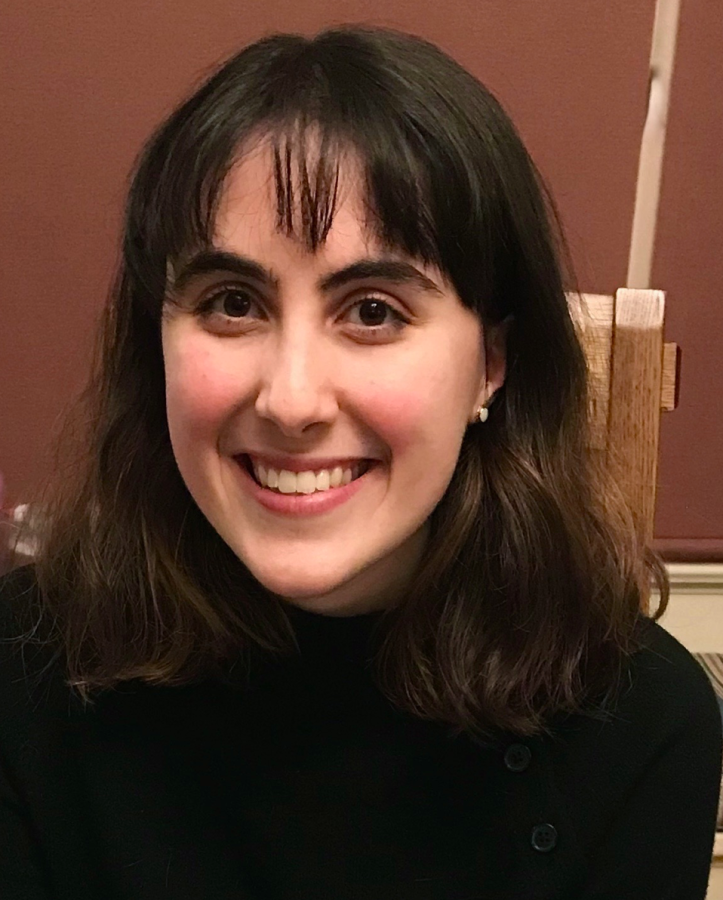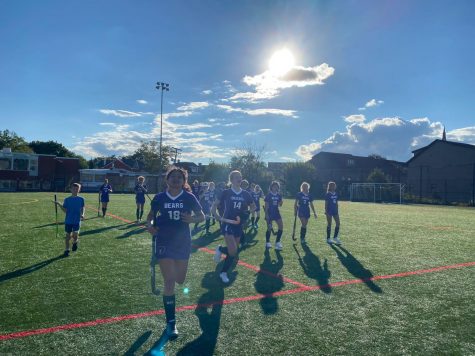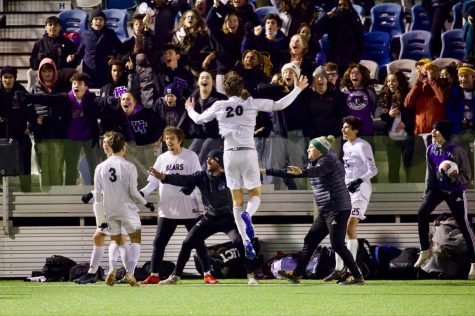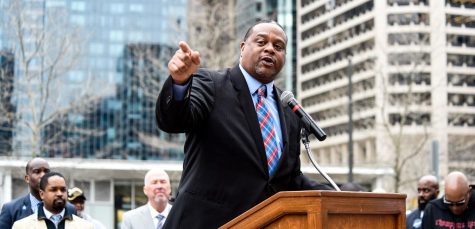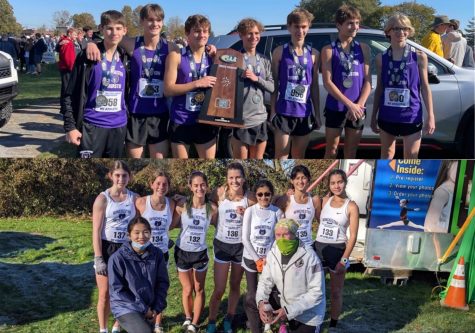“I want them to discover it for themselves”: A Sit Down with Carrie Mannino ’16, Playwright of It Couldn’t Happen Here
Would you like to start off by introducing yourself?
My name is Carrie Mannino, and I use she/her pronouns. I’m a graduate from Winchester, from which I graduated in 2016, and then I attended Yale, from which I graduated in 2020. I’ve developed this play, which is a documentary piece about the aftermath of the 10.27 attack in Pittsburgh. I’m a member of the Dor Hadash congregation, and I was away at the time of the shooting. I was at school, and I felt really disconnected from my community. I wasn’t able to mourn with the rest of my community, and I also was getting a lot of my information from the media, from people around me at Yale who didn’t know anything about Squirrel Hill or Pittsburgh, but had heard about this story, and that was so disorienting for me. I felt that there needed to be a broader story told about what it really means to be a Pittsburgher, what it means to live in Squirrel Hill, to grow up here, outside of just this one horrible event. I feel that the media picks up horrible events like this just for a couple of weeks, and it was horrifying to me that Squirrel Hill had become a household name only in this terrible context. So I wanted to tell a fuller story about what it really means to be part of this community. Creating this project was also a way for me to reconnect with my community, and was a big part of my own healing process.
The title of the play is “It Couldn’t Happen Here,” which was a quote from Dan Gilman. What about this quote stuck with you enough for it to be title worthy?
Before this even happened, I’d been very involved in the gun safety, anti-gun violence movement. I actually founded a March for Our Lives chapter at Yale. Continually, over and over again, the language that’s used when mass shootings and hate crimes happen in this country is, “we never thought this could have happened here”, “how could this have happened here?”, and of course when you hear that over and over again, and the same things keep happening and no changes are made to prevent these things from actually happening in the future, it becomes really frustrating.
When Dan Gilman said this, it was in the context of telling me that he wasn’t someone who would say “‘I never thought it could happen here,’ because you know it could.” I thought it was so powerful to emphasize that. He was working in local government; he recognized that there is this potential for threat, and it’s an unfortunate reality of living in this country. And it’s something that we shouldn’t have to deal with. It shouldn’t be a reality, but it is. Media often expresses shock when things like this happen. I feel like I am unfortunately no longer shocked. I’m sort of like, of course this is going to keep happening because it’s happened all these other times and you have done nothing to prevent it from happening again. So that’s where the title came from.
What was your intention for making this a docudrama?
So, I have a good answer to that and a bad answer to that. My simple boring answer is that I’m a playwright. I was studying playwriting. I do actually write in other genres, but in college I was really focused on playwriting. I decided I wanted to do a play as my senior thesis. I was very involved with the dramatic community on campus, and I’d been working as a director and a writer. The other reason, the more nuanced reason, is that when I was in high school here at WT, we did “The Laramie Project” as the winter play. And that was really important to me in introducing me to the genre of documentary theater, and also to show me how powerful this work could be and how it could be used as an educational tool. We had the opportunity to talk to somebody from the company that developed “The Laramie Project,” and I read more about it and the fact that it had been used in so many different schools across the country.
I think that there is something to be said for the degree of empathy you feel when you are either acting in a play or even just watching a play, especially when you know the people in it. Even when you don’t, I think that there’s something much more engaging for the audience with live theater than there is for film. I think that it’s just a different experience as an audience member, and an opportunity to have this greater degree of empathy and engagement, and to have audience members place themselves more into people’s shoes than if they were to just watch a video and be able to zone out. That was part of why I felt that this was something that lent itself to a stage format and it was something that could become a play.
Did you anticipate any backlash due to the subject matter of the play? And if so, how did you plan to address it?
I was extremely grateful for how positive the reaction was to the virtual reading over the summer. I’m very open to any sort of communication or feelings that people have in response. This is a consistent work-in-progress. I feel like writing is never finished. I think especially with a play like this, there are always more voices to add in, and more stories to tell. I really want to know how the Pittsburgh community responds and how they feel Pittsburgh has been represented.
I’m very excited to have it staged. I’m excited to see how that will work from an artistic perspective, but I’m not as concerned as I was before I shared the piece this summer. I wanted to know if people in my community felt they were being represented well and felt that I had done them justice. I was very nervous about that, but people were extremely kind and very supportive. If people don’t feel that way, I want to know, I want to be able to keep working on this project.
When did you know the play was finished/do you think it is finished?
I think deadlines are so important because otherwise you will write forever. This originally started out as my senior thesis, so I had a very hard deadline. I had to turn it in. It had to be done enough that I was ready to present it to my advisor if I wanted to graduate. The version I turned in is not the version that is currently being staged. It has gone through a lot of revisions since then. I think that with plays, it’s so incredibly important to hear them out loud in order to figure out whether or not a script actually works because theater is a staged art, sometimes something will look great on the page and then out loud, it just doesn’t sound right.
I had some incredible actor friends in college who did table reads with me while I was working on the first draft, and after I submitted my thesis, I submitted the play to the Yale Playwrights Festival and it was chosen, so I got to go through a workshop process with student actors and professional mentors, which was really helpful. I also had some time to do a few more interviews because it was difficult for me to do interviews while I was at school.
I think having actors that you trust and being able to talk with them and ask them: does this make sense to you? Does it seem like there is a good arc for your character? Do you feel like this works? Actors are embodying the words, and I think sometimes they know better than I do, and so I think all of that work with actors was really helpful.
In 2020, because of COVID, I came back to Pittsburgh and was working remotely after I graduated, so I had the opportunity to do a few more interviews on Zoom, and then I picked the play back up. I wanted to bring it back to Pittsburgh and I was just waiting out the pandemic for a while. And then I finally got to the point where I was like, I can’t wait this long, and I had seen all these other theater makers doing incredible work with virtual theater, and so I decided to do a virtual version of it with actors from Pittsburgh, which was really meaningful because I got to talk with them about their experiences and how they felt about the play. And so there was a little bit of editing that went on then as well, and that’s the version that you read.
I guess the answer is that every single time that I’ve had any sort of reading of it, I’ve made edits, but there have been less edits each time, and I think also with this piece, because I’m adding in more voices, if I’ve had the opportunity to interview more people I’ve wanted to add in more voices that I may not have been able to add in before.
But I think in general, I would say that even if you don’t think the work is done, get it out there because, even though I’ve known the play is something I want to keep working on, there’s no way that I can work it all out if it’s just in my own head. I need to be sharing it, and then I can take that feedback and work with it.
If you could say something to the audience before they saw “It Couldn’t Happen Here” what would you tell them?
I think that I would probably give them a little bit of an explanation about the form, because I think sometimes audience members aren’t sure what to expect, and to explain what documentary theater is and how it’s set up, and to explain that there is a narrative and an arc here, even though it’s not necessarily the type of plot you would usually expect in a typical play. I think I would also give content warnings, and emphasize that I really did not want this piece to be retraumatizing for anyone. I really tried to focus it on the people I talked with and their stories, and not to focus it on the trauma and the violence, but obviously it’s present, and if people feel at any point that they need space from it, or they need to leave the room or anything like that, that that is fine.
In terms of anything else, I want them to discover it for themselves. I think that I really attempted to have something for everyone in this play so that people could find things they related to, and I want them to find them on their own and not necessarily go in expecting, like “I’m only going to relate to the person who is the same age as me”, or who was from the same community as me or anything like that,I want people to go in with a more open mindset.
What advice do you have for people who are in high school who want to start writing plays? How did you get started with this?
I got started with this in Mrs. Holmes’s Theater class. I didn’t know much about theater when I entered high school. I did the middle school musical and I loved it, but I can’t sing. I’ve loved writing since I was a kid, and I’ve wanted to be a writer since I was in second grade. I enjoyed theater, but I had never really done it outside of musicals. Then I got to high school, and I found I really loved acting and being part of theater.
My sophomore year, I took Mrs Holmes’ classes. In one of them, we had a playwriting unit, and I had never done that before. I just hadn’t considered it. I was writing all the time, but I wasn’t writing plays. I started writing dialogue and I realized that I just really love it. I really loved putting characters in conversation, and so I wrote this one act that I worked on in Mrs Holmes’ class, and then I talked to her about it, and she actually let me put it on as one of the One Acts my junior year, which I am still so grateful for. She really made this possible for me, and I got to see my work on stage for the first time, and it was so exciting, and I wrote another play for my senior year One Acts, and I realized I just loved it.
I absolutely love getting to be a playwright, getting to work with actors. I have always loved theater and I found that this was really my space in theater—being a playwright, and then later directing. I’m so grateful to Mrs. Holmes because she really made it feel like it was possible for me to pursue this, and gave me my first opportunities to see my work on stage and try out directing, and then when I got to Yale, I pursued it a lot, I really worked on it.
My advice to young playrwights is to just start writing. Reach out to people at WT, reach out to Mrs. Holmes, because she’s a wonderful mentor, and ask people to read your work. If you have friends who are actors, or even just friends who read dialogue well, ask them to do a table read for you.
When I got to college, I was like I’m going to do theater, this is going to be great. And then I auditioned for a few plays, got rejected from all of them, applied to direct the freshman show, was rejected, applied to the Playwrights Festival, was rejected, applied for a playwriting workshop, was rejected. And I was like, oh no, maybe I can’t do this, maybe this is not for me. Maybe I’m not good enough. I was still writing, I was still working on stuff, and I had friends who were in the theater scene and were very supportive. I knew I could work with them. And so I decided that I was going to just put up my own play. I was like, why not? Yale has these things called Creative and Performing Arts grants that any student can apply for. They’ll let you use a space on campus, they’ll give you money, so I just applied to one, and they gave me funds, they let me put up this show. I cast it, it was mostly other freshmen. And then after that, the Dramatic Association knew I was somebody who could do this. And so when I applied to direct their fall show the next year, they chose my proposal. I got to use their professional theater space and things like that.
So my recommendation is to keep doing the writing, reach out to all of your friends, have them read it out loud, have them read it on the page, get other people’s advice, reach out to mentors, and then just put your work out there and see what happens. The thing about plays is you really need to hear them performed. So figure out a way to do it, even if it’s just that your friends come over someday, your friends are on Zoom with you and you all just read through it. It’s really helpful and it gives you an idea of how it would play, and it gets your work out there into the world.
This interview has been edited for length and clarity.
Carrie Mannino is a playwright and WT alum (‘16). While at WT, she was the editor of Plaid, and participated in theater as an actor, writer, and assistant director. She graduated from Yale University in 2020 with a degree in English, concentrating in creative writing. Her play, “It Couldn’t Happen Here” was selected for the Yale Playwrights Festival, and she was awarded Yale’s Marina Keegan Playwriting Award on graduation. She also received the Yale Academy of American Poets Prize, and her work has been published by Spires Literary Magazine, Red Cedar Review, and the Pittsburgh Post-Gazette. As an undergraduate, she directed “Julius Caesar” and her original play, “The Bench,” which first premiered at WT, and directed and produced an original short film, which premiered at the New Haven International Film Festival.


